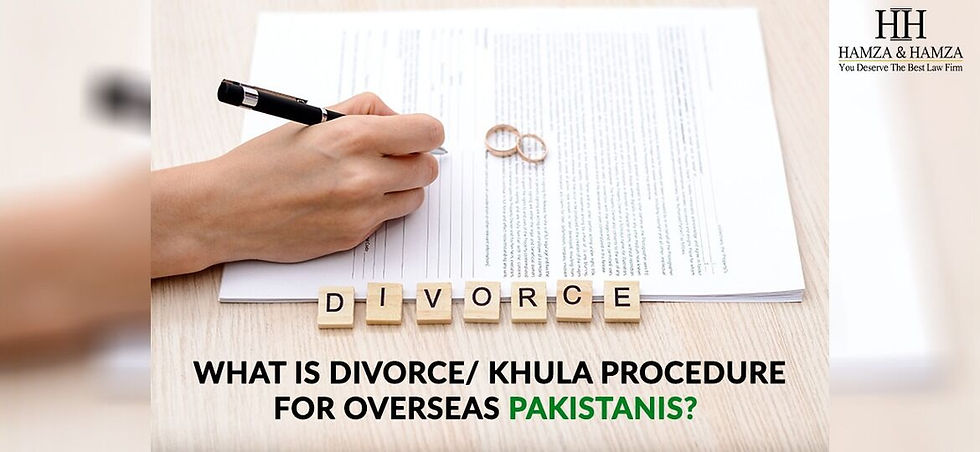Is Pakistan’s Khula Procedure Structured to Empower Women or Burden Them with Legal Complexities?
- Hamza and Hamza
- Jul 29, 2025
- 3 min read
Khula, the Islamic right of a woman to seek dissolution of her marriage, is legally recognized in Pakistan. While it is considered a major relief for women who seek autonomy and protection from abusive or irreconcilable relationships, the actual Khula Procedure In Pakistan is layered with cultural, legal, and procedural complexities. This raises an important question: Is Pakistan’s khula procedure structured to empower women or does it burden them with legal hurdles that compromise their freedom?
Understanding the Legal Foundation of Khula in Pakistan
Khula is rooted in Islamic jurisprudence and is recognized under the Family Courts Act 1964. According to Section 10 of this Act, a woman can file a suit for dissolution of marriage on the grounds of khula, which involves stating that she can no longer live with her husband within the bounds prescribed by Allah. The court, if satisfied that reconciliation is not possible, will issue a decree for dissolution, often requiring the woman to return her haq mehr (dower) or any other benefits received during the marriage.
The process typically begins with the wife filing a suit in the Family Court. The court then issues notices and conducts reconciliation proceedings. If reconciliation fails, the court passes a decree for dissolution. The entire procedure can take between three to six months, depending on the efficiency of the court and the conduct of the opposing party.
Challenges Faced by Women Seeking Khula
Despite its availability, the Khula Procedure In Pakistan presents a range of challenges:
Social Pressure and Stigma: Women who initiate khula often face intense societal pressure. Families may discourage the move, fearing dishonor or public criticism. In conservative communities, women are expected to "adjust" or "tolerate" marital difficulties, no matter how serious.
Financial and Legal Costs: Legal representation, court fees, and the requirement to return haq mehr can become financial burdens. For women who are financially dependent on their husbands or families, these costs can deter them from seeking relief.
Delays and Bureaucracy: The Family Court process, although designed to be expeditious, often suffers from delays due to case backlogs, absenteeism of parties, or misuse of procedural tactics by the opposing counsel.
Custody and Maintenance Battles: If children are involved, the khula process may extend to complicated custody and maintenance hearings. Often, women are threatened with loss of custody as a bargaining chip to prevent them from proceeding with khula.
Lack of Awareness: Many women are unaware of their rights under the law. They often assume divorce can only be initiated by the husband or are unaware of the legal channels available to them.
Reforms and Recommendations
To ensure that khula becomes a genuine avenue of empowerment, several reforms are necessary:
Legal Awareness Campaigns: Educational programs, particularly in rural and semi-urban areas, are crucial to inform women of their legal rights.
Free Legal Aid: State-supported or NGO-provided legal aid can help women access khula without financial distress.
Efficient Court Processes: Improving judicial efficiency and reducing case delays are essential. Specialized family court benches and time-bound procedures can greatly enhance the process.
Protection Against Retaliation: Women seeking khula must be protected from domestic or social retaliation. This includes ensuring secure housing, custody safeguards, and mental health support.
Conclusion: Seeking Relief Through Trusted Legal Experts
The khula procedure in Pakistan is both a legal and emotional journey. It is meant to offer women a dignified exit from oppressive marital relationships. However, due to procedural delays, cultural resistance, and financial burdens, the very system meant to empower can also intimidate. That’s why seeking professional legal guidance is essential for women who wish to navigate this path with confidence and legal protection.
Hamza & Hamza Law Associates have consistently provided compassionate and skilled legal representation for women seeking khula across Pakistan. Their expertise in family law ensures that clients are not only legally protected but also emotionally supported throughout the process. For women in need of clear guidance and assertive legal action, Hamza & Hamza Law Associates stand as a reliable ally.








Comments